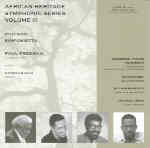The latest entry in Cedille’s very worthy African Heritage Symphonic Series offers the most interesting repertoire yet. The four works included here, all by living composers, demonstrate a wide range of styles and compositional techniques that place their respective authors squarely in the mainstream of contemporary music. Whereas earlier issues focused on the process of “assimilation”, of artists coming to grips with a musical culture that labeled them outsiders and aliens, and while even here prejudice and stereotyping to some extent determined the career options open to the two older composers (David Baker and Coleridge-Taylor Perkinson, born in 1931 and 1932 respectively), these works all project the feeling of having been written from the “inside”.
The reason for this impression probably results from two factors: increased acceptance of African American composers as writers of “classical music”, and probably more importantly, acceptance of African American popular music idioms (especially jazz) into the language of so-called “art” music. Baker’s Cello Concerto and Perkinson’s Sinfonietta No. 2 make this process very clear. The first work, written for the composer’s friend and teacher Janos Starker and commandingly performed by Dutch cellist Katinka Kleijn, remains a gritty and harmonically dense piece in which the soloist communes with various sections of the orchestra in sustained dialog. It’s chamber music writ large, its improvisatory feel pointing more powerfully to the composer’s extensive jazz credentials than to his facility for more overtly popular elements. On the other hand, Perkinson’s piece combines various folk songs with the famous BACH motive to create a Bartókian synthesis quite unlike anything else.
William Banfield’s Essay for Orchestra reveals a touch of Sibelius in its accumulation of incident over long-held pedal tones, but its thematic material and interesting orchestral garb, with extensive percussion commentary accompanying all of the other instruments, create a very distinctive impression. The first work on the disc, Michael Abels’ Global Warming, refers both to the environmental phenomenon and to the emotionally contrasting idea of improved relations among nations, and the music illustrates this dichotomy beautifully, with an opening (and concluding) evocation of heat and stillness enfolding a dance section in which imitation Irish folk music rubs shoulders with something vaguely Middle Eastern. It’s delightful. The Chicago Sinfonietta’s amazingly assured performances of this wildly diverse assortment enjoy perfectly balanced, warmly focused recorded sound. This is a very satisfyingly executed project that makes its points in the only way that ultimately matters: by offering excellent interpretations of interesting, thoughtful, and enjoyable music. [2/8/2003]
































